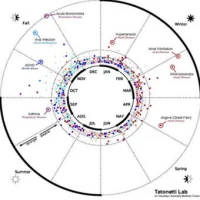According to a report published in the American Journal of Preventive Medicine, there is a possibility of increased risk of cardiovascular disease and lung cancer in nurses working rotating night shifts.
Night shift work has previously been associated with higher risk for cardiovascular disease and cancer. According to the WHO, night shift work may be classified as a probable carcinogen due to circadian disruption.
A study was conducted with 75,000 registered US nurses to investigate the links between rotating night shift work and all-cause, CVD and cancer mortality. Women with pre-existing CVD or other than non-melanoma skin cancer were excluded from the study. Rotating shift work was defined as working at least three nights per month in addition to days or evenings in that month. Data was obtained from the Nurses' Health Study (NHS) and the study authors analysed 22 years of follow-up.
The findings show that women who worked rotating night shifts for five or more years appeared to have a modest increase in all-cause and CVD mortality. Those working 15 or more years of rotating night shift appeared to have a modest increase in lung cancer mortality. Mortality from all causes was found to be 11 percent higher for women with 6 to 14 or greater than 15 years of rotating night shift work while CVD mortality was 10 and 23 higher for these groups respectively.
No association was found between rotating shift work and cancer mortality. However, there was a 25 percent higher risk of lung cancer for women who worked shift work for 15 years or more.
According to Eva S. Schernhammer, MD, DrPH, currently
Associate Professor of Medicine, Harvard Medical School, and Associate
Epidemiologist, Department of Medicine, Brigham and Women's Hospital, Boston,
this study “is one of the largest prospective cohort studies worldwide with a
high proportion of rotating night shift workers and long follow-up time. A
single occupation (nursing) provides more internal validity than a range of
different occupational groups, where the association between shift work and disease
outcomes could be confounded by occupational differences.”
Dr. Schernhammer also points out that the results of this study add to prior evidence of the detrimental effect of night shift work on health and longevity. It is important to further explore the role of duration and intensity of rotating night shift and the interplay of shift schedules as per individual type.
Source: American Journal of Preventive Medicine
Image Credit: Gopixpic.com










